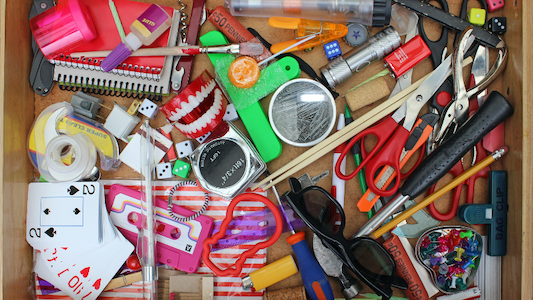I’m doing more organizing these days. Still coaching, of course, and coaching within the context of the organizing sessions – but the need for clutter assistance is not going away anytime soon. I’ve always enjoyed helping people in this way, too. I talk with clients about “low-hanging fruit” – the more straightforward stuff and decisions that can open up a little crack in the overwhelming boulder of a process. While it’s often something like grabbing a box and going after the obvious giveaway items, it struck me the other day that the “no’s” for keeping stuff at bay can be pretty easy, too. It’s like setting boundaries for yourself on the front end, and it adds up. There are tons of prevention strategies that, if caught in the moment, are powerful. To name a few:
- Bulk mail advertisements (i.e., JUNK) do not deserve your precious, finite energy and attention – nor do they deserve a space on the counter. If you get caught up in wondering, “Gee, maybe I do need to see about a quote for installing UV protectant on my windows…” stop and consider: were you thinking about that in the first place? And if you were, where would you head first for more information? I’ll bet you a box of shredding, not to the pile of paper on the kitchen table. Imagine yourself as the human equivalent of a spam filter, and pitch all that stuff before it even gets through the door.
- Consider – the math, social studies, and spelling tests from this school year are not your child. They are pieces of paper with pencil marks on them, and they are not relevant now. Recycle them all, enjoy the freedom, and relish having the space to sit down and work a puzzle with said child.
- That holiday card is not your favorite cousin’s family. It’s a card, which is a piece of pressed wood pulp with a chemical likeness of people you happen to love. Throw it out and Facetime them this weekend. Also, read this and maybe reconsider the whole card situation anyway (I’m suddenly feeling guilty about my son’s graduation announcements – friends and family, you can totally pitch those now).
- Twelve-dollar check-out line magazines. No. Just…no.
- That subscription box is not a fun bargain. It’s a collection of someone else’s decisions adding to your monthly pileup like Great Aunt Edna’s bolognese on spaghetti. Shut them off and take a little time to choose things for yourself – things you use and appreciate. Note: I have a deep dislike of subscription boxes of any kind. If there’s a person out there who has truly used every single item that comes to you, who never has box “leftovers” with no place to go, I’d love to hear about it. Go ahead. I’ll wait.
- Those giveaways you picked up at an event are not free – they are little rubber and plastic dopamine pushers that, while fun in the moment, eventually cost you peace of mind fretting over what to do with them. They end up wandering the confines of a junk drawer, pushed to and fro as you search for the dog’s nail clippers. They may even cost time and money if you get fed up and reach out to someone like me to help clear everything out. So admire that booth at the expo. Talk to the people. Learn. But when it comes to those chip clips and stress balls, keep walking.
You know they’re in there.
- That yard sale bird house is not a quick deal. I get it – you’re super creative and you love wildlife. On the optimistic side, it’s an entire Saturday project of repairing, painting (oops, and a trip to Lowe’s for finishing nails, a paintbrush, and birdseed – more stuff), hauling out the ladder, debating with your spouse about the right branch, filling and hanging. On the pessimistic side, it’s a thing languishing in the garage that’s also taking up space in your brain. Harsh? Maybe – but the point is to proactively consider the entirety of what that one “quick, cheap” purchase will mean for you.
- The “perfectly good” stuff your parents brought over – who is it perfect for? OK, so no, this is not low-hanging fruit. I acknowledge gifting (and potential rejection of such) is a toughy – there are all those guilty feelings to consider. So maybe the message here is more for the loving parents out there: please, ask first before you cheerily show up with that card table. And if the answer is “no, thank you,” perhaps you can be grateful that your children were so incredibly well-raised and independent that they now have their own furniture, decor, books, vinyl records, flower pots, and tools.
Sure, you could sell off, trash, or donate most of these things when you get around to it. You can always let go of them…later. But why even go there in the first place? What kinds of prevention strategies do you use to keep things under control?





I love your phrase, “human equivalent of a spam filter.” And really, that is your point. Don’t let the non-negotiables take up residence in the first place. If you active the “filter” by creating some boundaries upfront, there will be less clutter to handle going forward.
One of my strategies is with mail. I bring it in daily and sort it immediately. I’m ruthless with recycling the junk mail right away. Usually, the “keepers” are minimal and get routed to their designated spots. Bills to the “bills to pay” folder, magazines to the magazine bin, etc… Most days of the 10-20 pieces that come in, there are anywhere from zero to 4 keepers.
Another strategy is with magazines. We have several subscriptions. When the newest issue arrives, I recycle the previous one. It keeps the pile manageable and current.
Isn’t it nuts how much that comes into the mailbox is a big pile of nothing? As opposed to looking forward to a letter, I find myself gamifying the process with how much can I throw directly into recycling. Oh, the trees. I also quit subscribing to magazines entirely, because I found most of them get repetitive. I know I’d lose that argument with most clients, so your new-in-old-out is a great idea to pass along. Thanks for the thoughtful comments, Linda!
At the end of the school year, my kids would go to a friend’s bonfire and burn their school papers under their parents’ supervision. Thanks for giving examples of low-hanging fruit.
My son did something similar with his AP Chemistry notes (from the year of online school – chemistry does not translate well virtually!). It was a great way to get rid of the excess, AND cathartic! Thanks for stopping by, Sabrina!
Perhaps it’s because I’m Paper Doll, but (environmental concerns aside), I find the process of getting a big stack of mail (even if much of it is junk) and sorting through it to be zen-like and relaxing. I’m definitely the human spam filter, but I’m much more rigorous about deleting digital spam before reading it. I like looking at the junk mail and laughing at the offer of a business loan of $250,000 or the “deal” I can get on aluminum siding (when I live in a rental building). Mail aside, although I’d never consider myself a minimalist, almost nothing comes into my home that I don’t like and want; I accept (and prune) with intentionality.
But please feel free to re-route your subscription boxes to me! 😉
Wait…no, really? You have subscription boxes!? I need to hear more about this.
And yes, I love going through paper too. It’s such a relief to see it all heading to the free shred day.
This is a terrific list! I was just talking with my daughter about the whole subscription thing. It is definitely a trend now, but it often ends up creating clutter. We rarely process subscriptions at the pace they arrive. The manufacturers know this, and lock us into receiving items more quickly than we really need them. Are they subscriptions that make sense? Of course! But it really is wise to seriously consider how much you want something before signing up for a subscription.
I often have the conversation about cards being “greetings.” Once the greeting has been received and appreciated, the card can go. Don’t keep all the Christmas cards you receive year after year!!
Some make sense, some do not (“surprise” boxes? monthly plastic toy boxes??). Either way, the stuff almost never gets fully used. We signed up for a meal prep service once, thinking it would make life easier – somehow we often ended up not fixing one per week (food wasted), and oh my gosh the packaging. It’s one thing to auto order a regular-use item like detergent, it’s another to impulsively sign up for what amounts to random marketing. OK, off the soap box now 😀 – thanks for commenting Sabrina!
I know a woman who used to keep a container of odds and ends (giveaways)in her daughter’s room when she was younger. Every once in a while she and her daughter would empty the whole thing into the trash or recycle so she could start over. Kids collect the oddest arrangement of little things. At the moment it seemed so important to her child but over time they realize it was just clutter.
What a brilliant idea – and a much more compassionate way of dealing with weird kid odds and ends than just insisting they all be trashed right away. Similarly, someone once told me that when they didn’t know where to put something, they had a large basket in their main living area where they stashed it. Then, about once a month or so they would go through it and either find homes or discard. Why not? If a strategy helps keep the clutter contained (and less on the brain), I think that’s a system that works. Thanks, Janet!
I love the expression ‘low-hanging fruit’. This is a fabulous post, Sara. Taking care of the things that are quick and easy to do promotes more forward action and the thought ‘that was easy, what else can I do?’
Boundaries are wonderful to set as long as you can stretch them every now and then. I often talk with my clients about their boundaries for things coming into their homes. Understanding that everyone in the family may have different boundaries for things is important.
Yes, my hope is always that tackling something less daunting gets the ball rolling. You make a good point about the boundaries – some people actually do save greeting cards much like others do photos, and they organize and enjoy them from time to time. That’s a totally different situation than letting them pile up and get buried under other items, and not ever even thinking about looking back at them. Thanks for the comment, Diane!
Thanks Sara for another encouraging post!
I want to add that some of us know the rare individual who is a bona-fide “creative reuse” advocate. They LIVE FOR OUR JUNK and find joy in sourcing school programs, workshops, camps, churches, etc with free stuff for art projects. They have big garages and sometimes even warehouses. It can be worth it to take a look around and see who might use your old stuff.
Arguably all the junk ends up as…more junk, transformed. But it’s the creative process that counts!
This is very true, and I’m all for transforming “junk,” thrifting for needed items, etc. The challenge comes when we take stuff to one of the these lovely, creative individuals – and come back with more than we came with! Thanks so much for the comment, Laura.